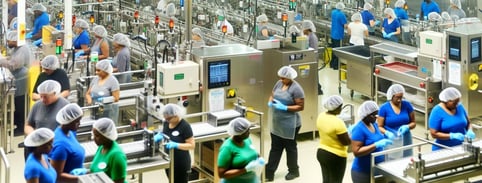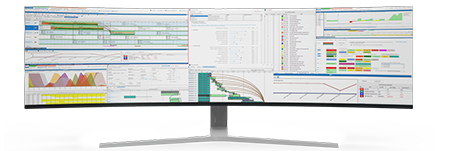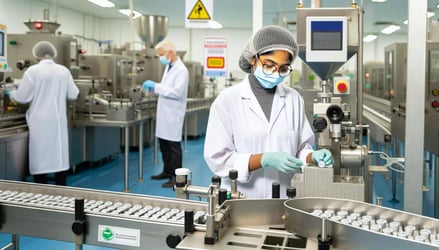In the regulated landscape of the Food and Beverage (F&B) industry, ensuring food safety compliance is a top priority for manufacturers. Production planning plays a crucial role in achieving this goal by streamlining processes, minimizing risks, and ensuring the efficient use of resources. As a Manufacturing IT Manager in a F&B facility, you understand the challenges of meeting regulatory requirements while maintaining operational excellence.
This blog will explore how integrating advanced production planning tools, such as PlanetTogether, with leading Enterprise Resource Planning (ERP), Supply Chain Management (SCM), and Manufacturing Execution Systems (MES) can elevate your production planning strategies and enhance food safety compliance.

The Significance of Food Safety Compliance in Manufacturing
Before looking into the integration of production planning tools, let's emphasize the importance of food safety compliance in the F&B industry. Stringent regulations, such as the Food Safety Modernization Act (FSMA) in the United States and similar regulations worldwide, compel manufacturers to implement robust processes to prevent contamination, trace product origins, and respond swiftly to potential issues. Failure to comply not only poses significant risks to public health but can also result in severe legal and financial consequences for the company.
Challenges in Production Planning for Food Safety Compliance
Meeting food safety compliance requirements adds complexity to production planning. Factors such as varying demand, stringent shelf-life considerations, and the need for traceability make it challenging to strike the right balance between efficiency and compliance. Traditional production planning methods often fall short in addressing these challenges, leading to increased risks of non-compliance.
![]()

Integrating PlanetTogether with ERP, SCM, and MES Systems
To overcome these challenges, forward-thinking F&B manufacturers are turning to advanced production planning solutions like PlanetTogether. This powerful tool uses advanced algorithms and real-time data to optimize production schedules, ensuring efficient resource utilization while meeting compliance requirements. However, the true transformative power lies in integrating PlanetTogether with existing ERP, SCM, and MES systems.
PlanetTogether and SAP Integration
Seamless integration between PlanetTogether and SAP ERP enhances data accuracy and visibility across the production process.
Real-time synchronization enables quick adaptation to changes, reducing the risk of deviations from food safety protocols.
PlanetTogether and Oracle Integration
Oracle SCM integration allows for a unified view of the entire supply chain, helping manufacturers anticipate and mitigate potential disruptions.
Improved collaboration and data exchange between production planning and Oracle MES streamline operations and enhance traceability.
PlanetTogether and Microsoft Integration
Integration with Microsoft Dynamics ERP ensures a user-friendly and familiar interface for manufacturing IT teams.
Advanced analytics and reporting capabilities provide valuable insights into production processes, aiding in continuous improvement and compliance.
PlanetTogether and Kinaxis Integration
Integration with Kinaxis RapidResponse enhances supply chain visibility, enabling proactive decision-making in response to changing conditions.
The combined power of Kinaxis for SCM and PlanetTogether for production planning creates a unified ecosystem for efficient compliance management.
PlanetTogether and Aveva Integration
Integration with Aveva MES bridges the gap between planning and execution, enabling real-time monitoring of production activities.
Enhanced data flow and communication between Aveva and PlanetTogether improve the accuracy of production plans and compliance measures.

Benefits of Integration
The integration of PlanetTogether with ERP, SCM, and MES systems provides several tangible benefits for Manufacturing IT Managers:
Enhanced Visibility
Real-time data synchronization ensures that all stakeholders have access to accurate, up-to-date information.
Improved visibility into the production process allows for proactive decision-making to address potential compliance issues.
Efficient Resource Utilization
Advanced algorithms optimize production schedules, ensuring efficient use of resources without compromising food safety protocols.
Integration with SCM systems enables better demand forecasting, preventing overproduction and reducing waste.
Streamlined Communication
Seamless communication between production planning and execution systems minimizes the risk of errors and misinterpretations.
Automated alerts and notifications facilitate quick response to deviations from compliance standards.
Traceability and Compliance Reporting
Integration ensures accurate data capture throughout the production lifecycle, enhancing traceability.
Comprehensive reporting capabilities enable quick generation of compliance reports, simplifying audits and regulatory inspections.
In the ever-evolving landscape of F&B manufacturing, production planning plays a pivotal role in achieving food safety compliance. By integrating advanced planning tools like PlanetTogether with leading ERP, SCM, and MES systems, Manufacturing IT Managers can harness the full potential of their production processes. The resulting synergy between these systems not only optimizes resource utilization but also ensures a streamlined and compliant manufacturing environment.
As regulations continue to evolve, staying ahead of the curve with integrated production planning solutions becomes not only a necessity but a strategic advantage for F&B manufacturers committed to delivering safe and high-quality products to consumers worldwide.
Topics: PlanetTogether Software, Integrating PlanetTogether, Efficient Resource Utilization, Streamlined Communication, Enhanced Visibility, Traceability and Compliance Reporting




















LEAVE A COMMENT